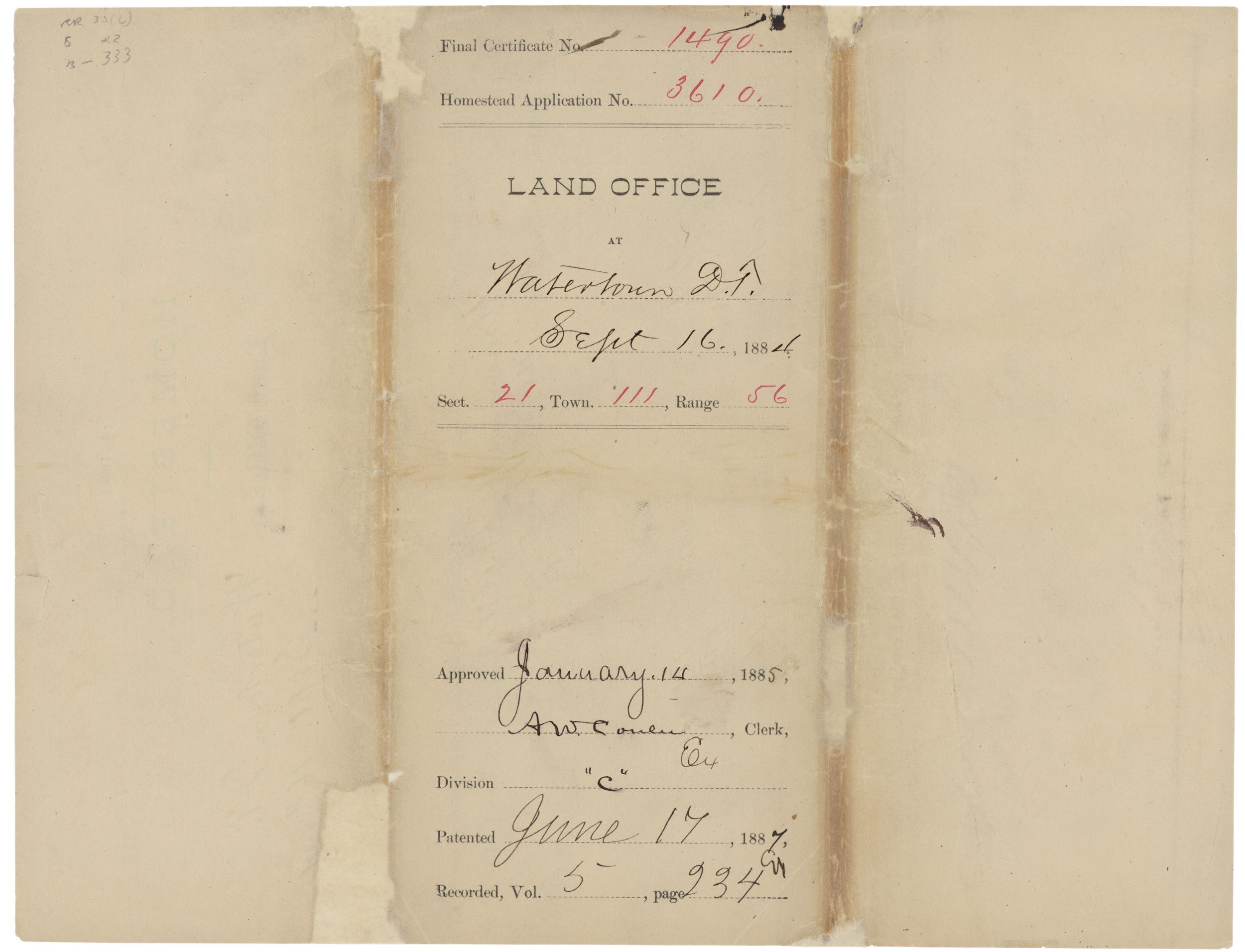The Homestead Act of 1862
Finding a Sequence
All documents and text associated with this activity are printed below, followed by a worksheet for student responses.Introduction
The Homestead Act changed the complexion of the United States and the world forever. The offer of free land encouraged millions from all across the globe to collect in the United States. The Homestead Act defines the American Dream! Under this law more than 270 million acres or 10 percent of the nation was given away in search of that dream. This activity serves as a good review of the documentation required under the Homestead Act of 1862. Homesteading documents should be viewed with an eye towards what document it is, not who the document is about or the date of the document.Name:
Class:
Class:
Worksheet
The Homestead Act of 1862
Finding a Sequence
Examine the documents in this activity. Put the corresponding document numbers in order using the list below. Write your conclusion response in the space provided.1
2
3
4
5
6
Hints for this Activity
- Remember the date is not significant.
- Remember the date is not significant.
- Remember the date is not signifiicant.
- Remember the date is not significant.
1
Activity Element
Page 1
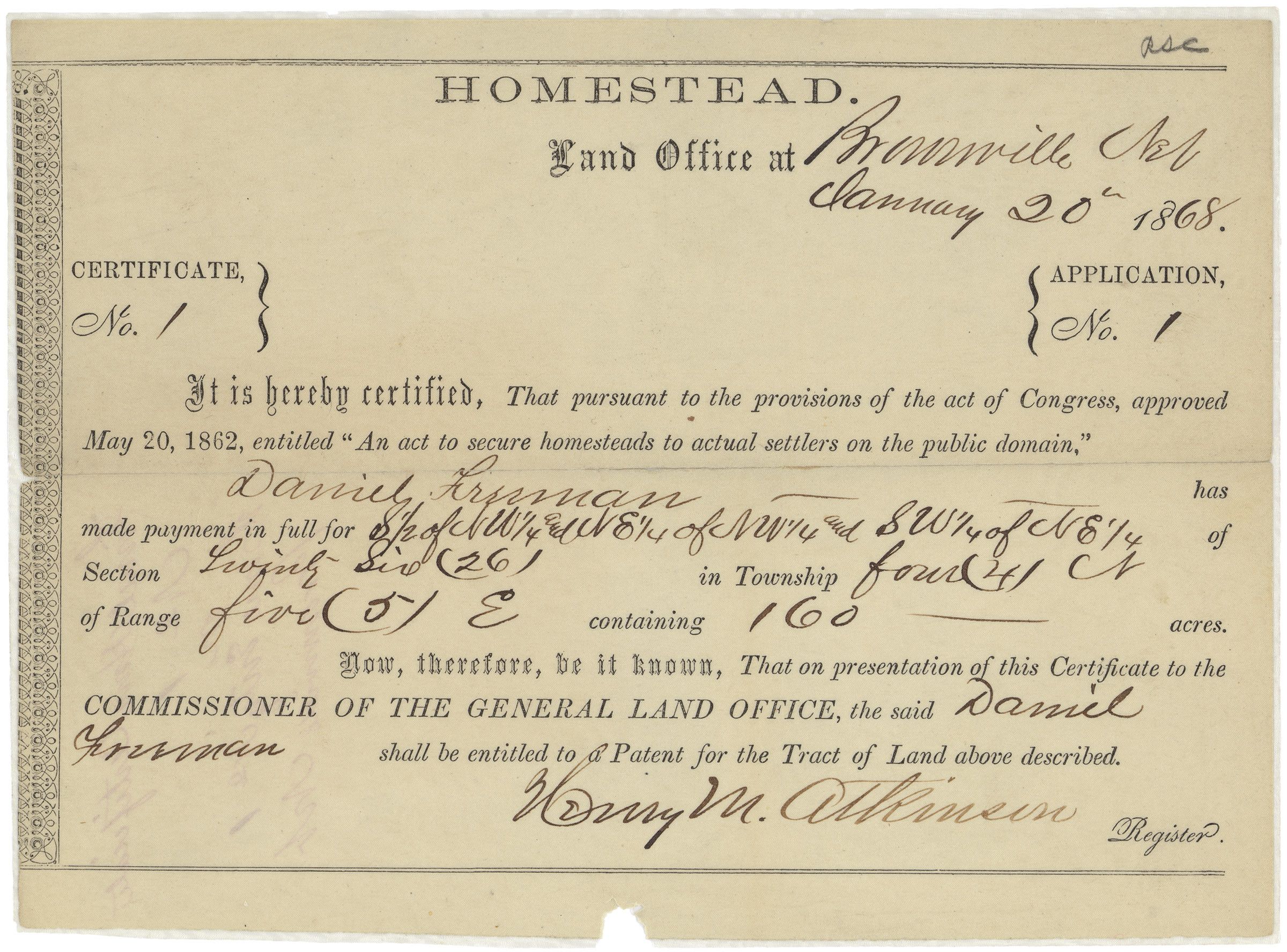
2
Activity Element
Page 1
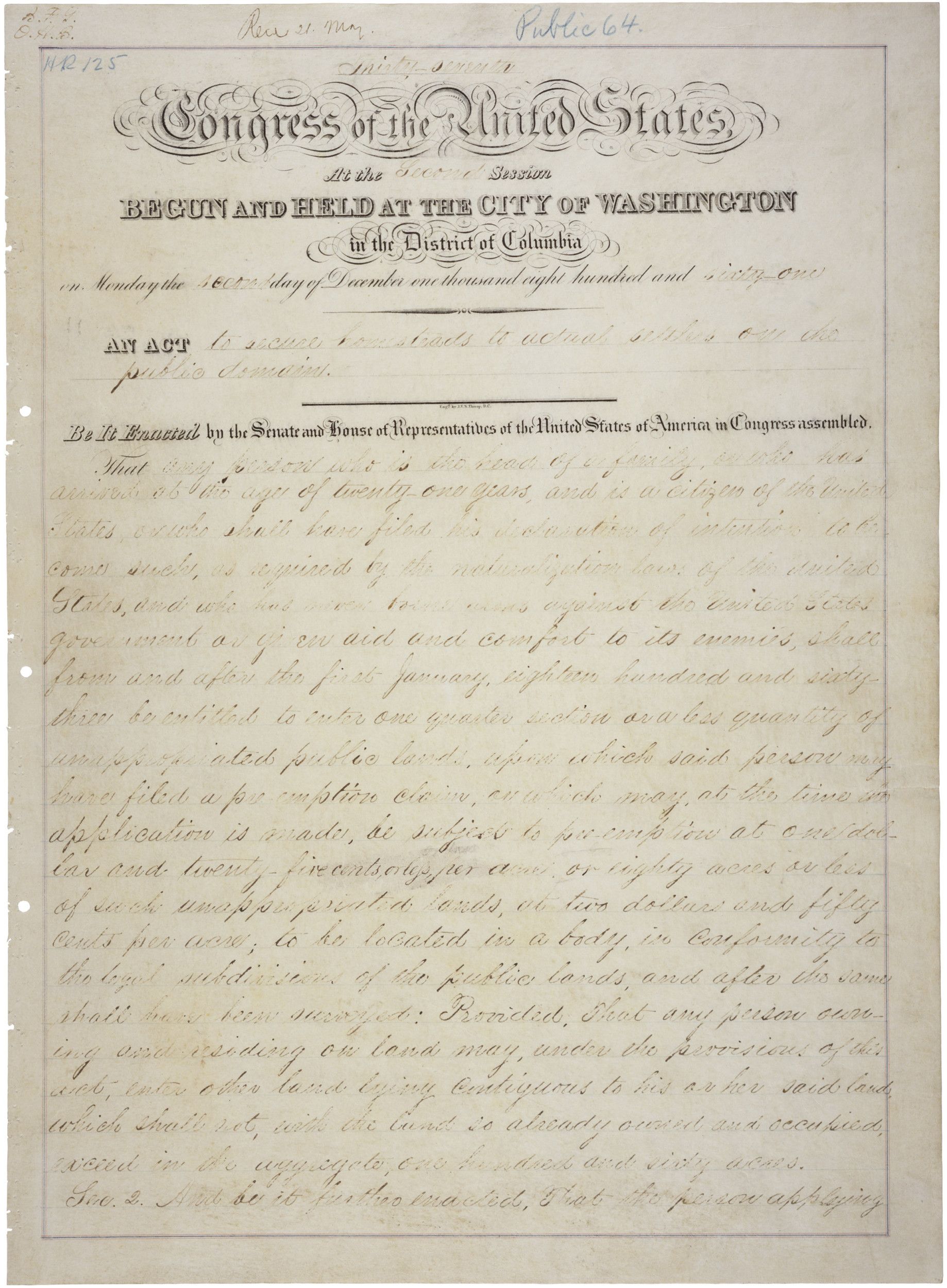
3
Activity Element
Page 3
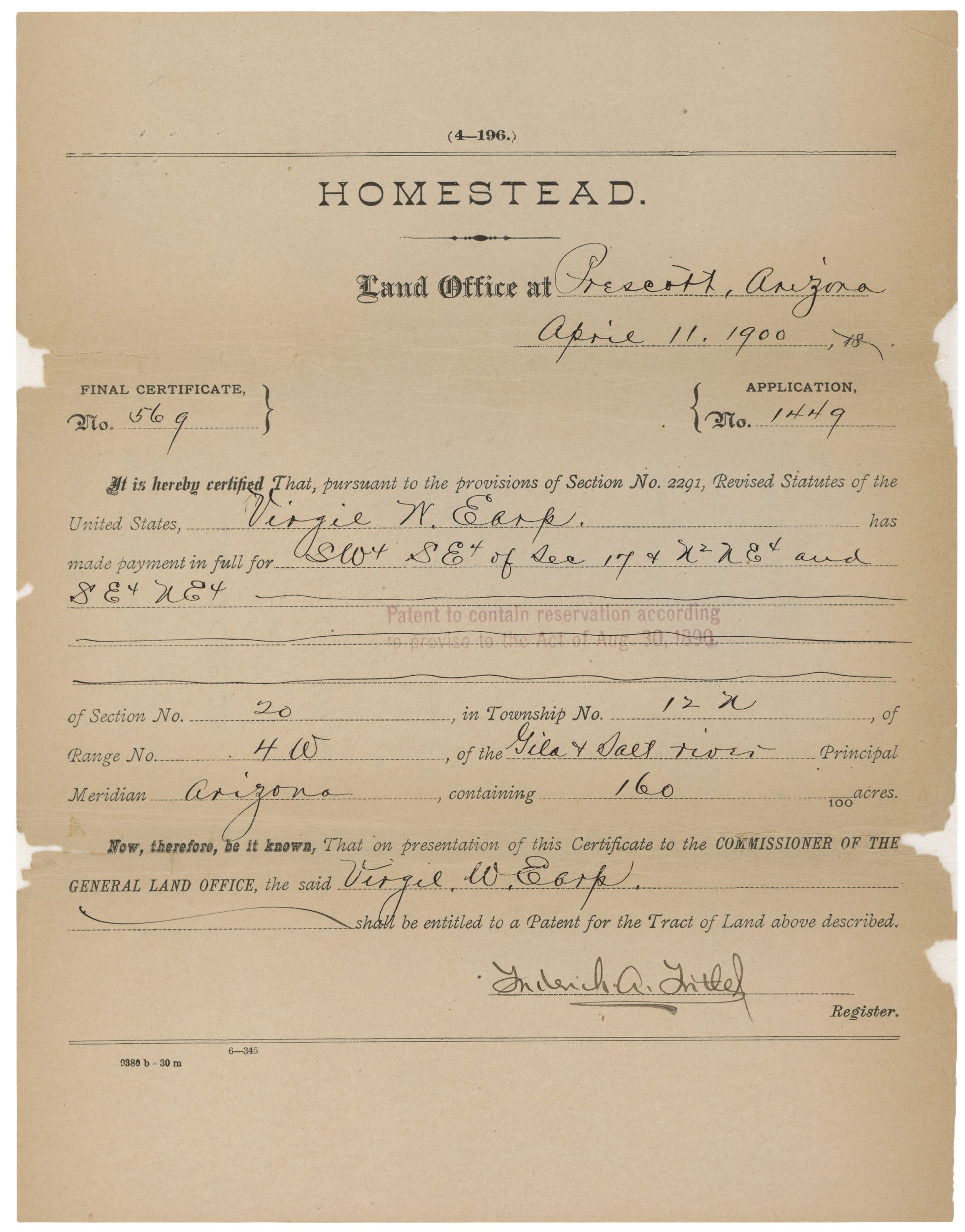
4
Activity Element
Page 1
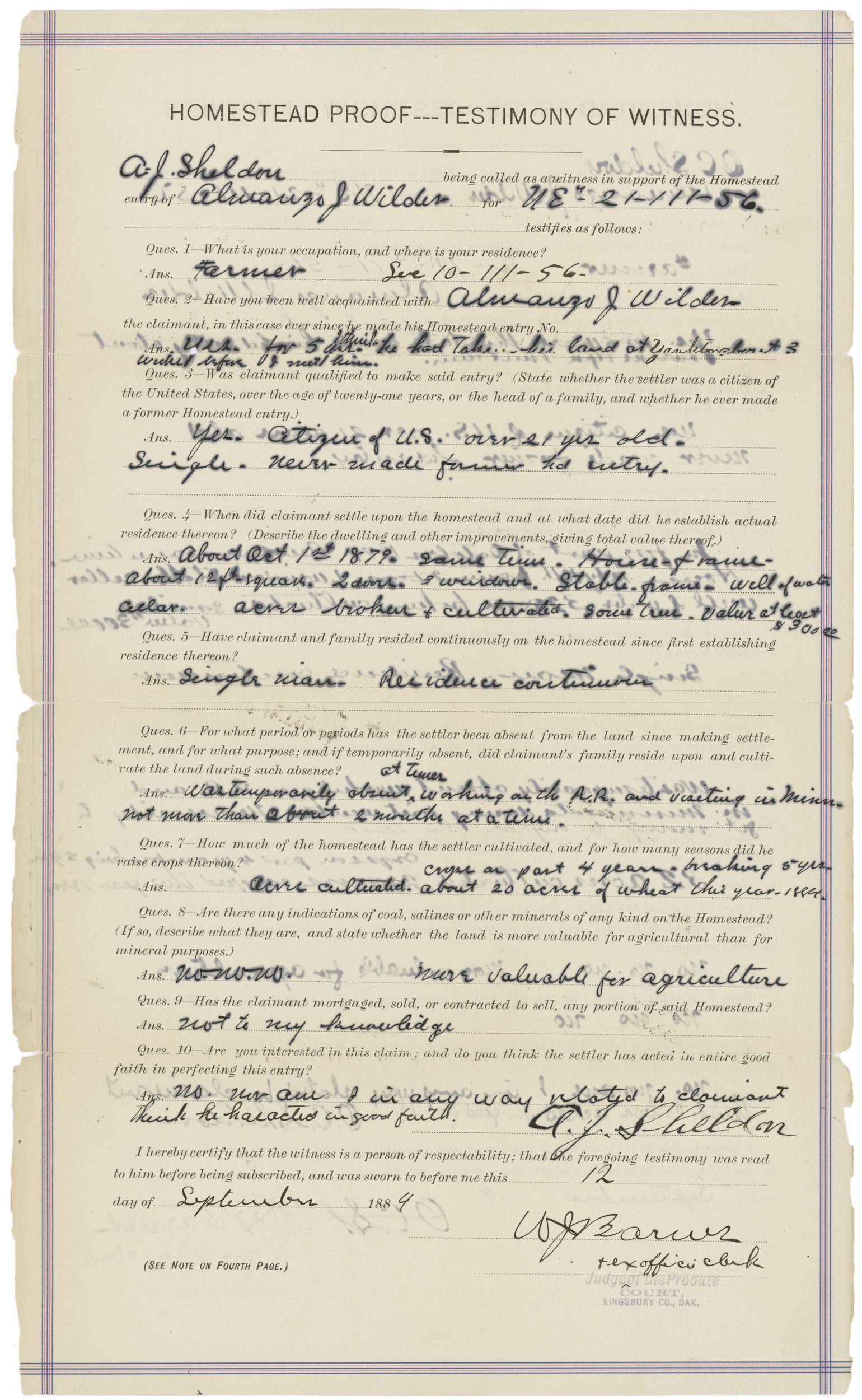
5
Activity Element
Page 1
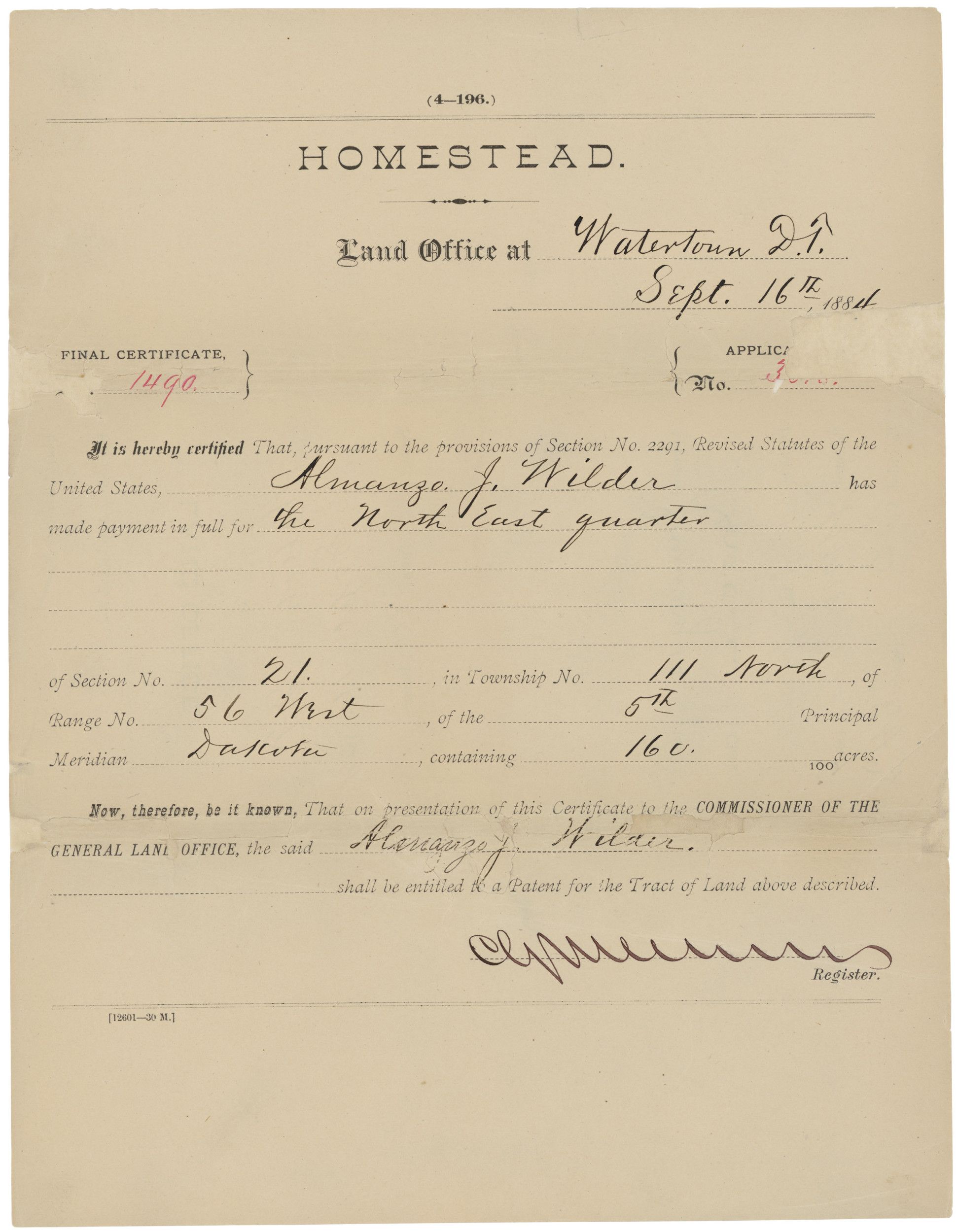
6
Activity Element
Page 1
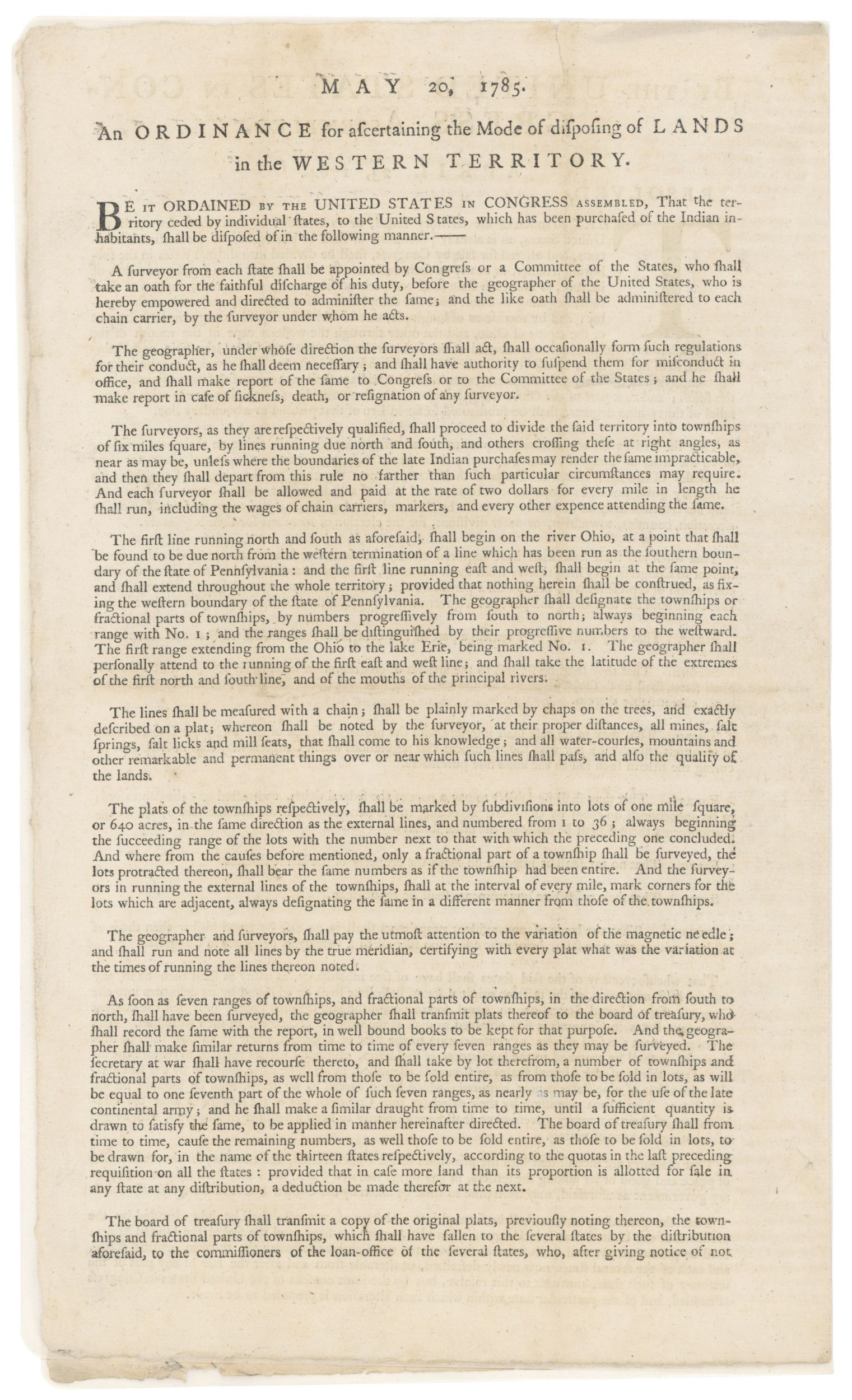
Conclusion
The Homestead Act of 1862
Finding a Sequence
Homesteading had a significant impact on the history of immigration, industrialization, agriculture, and transportation, as well as social, environmental, and cultural histories. Today there may be as many as 93 million people who are descendent of homesteaders; they are a testament to the impact that this legislation had on our country.Your Response
Document
Act of May 20, 1862 (Homestead Act), Public Law 37-64 (12 STAT 392)
5/20/1862
President Abraham Lincoln signed the Homestead Act on May 20, 1862, during the Civil War. The act provided that any adult citizen, or future citizen, who had never borne arms against the U.S. government could claim 160 acres of surveyed government land.
On January 1, 1863, Daniel Freeman made the first claim under the Act. Claimants were required to "improve" the plot by building a dwelling and cultivating the land. After 5 years on the land, the original filer was entitled to the property, free and clear, except for a small registration fee. Title could also be acquired after only a 6-month residency and trivial improvements, provided the claimant paid the government $1.25 per acre. After the Civil War, Union soldiers could deduct the time they had served from the residency requirements.
In reality, few laborers and farmers could afford to build a farm or acquire the necessary tools, seed, and livestock. Most of those who purchased land under the act came from areas quite close to their new homesteads (Iowans moved to Nebraska, Minnesotans to South Dakota, and so on). Unfortunately, the act was framed so ambiguously that it seemed to invite fraud, and early modifications by Congress only compounded the problem. Most of the land went to speculators, cattlemen, miners, lumbermen, and railroads. Of some 500 million acres dispersed by the General Land Office between 1862 and 1904, only 80 million acres went to homesteaders. Indeed, small farmers acquired more land under the Homestead Act in the 20th century than in the 19th.
On January 1, 1863, Daniel Freeman made the first claim under the Act. Claimants were required to "improve" the plot by building a dwelling and cultivating the land. After 5 years on the land, the original filer was entitled to the property, free and clear, except for a small registration fee. Title could also be acquired after only a 6-month residency and trivial improvements, provided the claimant paid the government $1.25 per acre. After the Civil War, Union soldiers could deduct the time they had served from the residency requirements.
In reality, few laborers and farmers could afford to build a farm or acquire the necessary tools, seed, and livestock. Most of those who purchased land under the act came from areas quite close to their new homesteads (Iowans moved to Nebraska, Minnesotans to South Dakota, and so on). Unfortunately, the act was framed so ambiguously that it seemed to invite fraud, and early modifications by Congress only compounded the problem. Most of the land went to speculators, cattlemen, miners, lumbermen, and railroads. Of some 500 million acres dispersed by the General Land Office between 1862 and 1904, only 80 million acres went to homesteaders. Indeed, small farmers acquired more land under the Homestead Act in the 20th century than in the 19th.
Transcript
Rec[?] 21 MayPublic 64
HR 125
Thirty-seventh
Congress of the United States
At the Second Session
BEGUN AND HELD AT THE CITY OF WASHINGTON
In the District of Columbia
On Monday the [second] day of December one thousand eight-hundred and sixty-one
[line]
AN ACT to secure homesteads to actual, settlers on the public domain.
[line]
Be it Enacted by the Senate and House of Representatives of the United States of America in Congress assembled, That any person who is the head of a family, or who has arrived at the age of twenty-one years, and is a citizen of the United States, or who shall have filed his declaration of intention to become such, as required by the naturalization laws of the United States, and who has never borne arms against the United States Government or given aid and comfort to its enemies, shall, from and after the first January, eighteen hundred and. sixty-three, be entitled to enter one quarter section or a less quantity of unappropriated public lands, upon which said person may have filed a preemption claim, or which may, at the time the application is made, be subject to preemption at one dollar and twenty-five cents, or less, per acre; or eighty acres or less of such unappropriated lands, at two dollars and fifty cents per acre, to be located in a body, in conformity to the legal subdivisions of the public lands, and after the same shall have been surveyed: Provided, That any person owning and residing on land may, under the provisions of this act, enter other land lying contiguous to his or her said land, which shall not, with the land so already owned and occupied, exceed in the aggregate one hundred and sixty acres.
SEC. 2. And be it further enacted, That the person applying
for the benefit of this act shall, upon application to the register of the land office in which he or she is about to make such entry, make affidavit before the said register or receiver that he or she is the head of a family, or is twenty-one years or more of age, or shall have performed service in the army or navy of the United States, and that he has never borne arms against the Government of the United States or given aid and comfort to its enemies, and that such application is made for his or her exclusive use and benefit, and that said entry is made for the purpose of actual settlement and cultivation, and not either directly or indirectly for the use or benefit of any other person or persons whomsoever; and upon filing the said affidavit with the register or receiver, and on payment of ten dollars, he or she shall thereupon be permitted to enter the quantity of land specified: Provided, however, That no certificate shall be given or patent issued therefor until the expiration of five years from the date of such entry ; and if, at the expiration of such time, or at any time within two years thereafter, the person making such entry ; or, if he be dead, his widow; or in case of her death, his heirs or devisee; or in case of a widow making such entry, her heirs or devisee, in case of her death ; shall. prove by two credible witnesses that he, she, or they have resided upon or cultivated the same for the term of five years immediately succeeding the time of filing the affidavit aforesaid, and shall make affidavit that no part of said land has been alienated, and that he has borne rue allegiance to the Government of the United States; then, in such case, he, she, or they, if at that time a citizen of the United States, shall be entitled to a patent, as in other cases provided for by law: And provided, further, That in case of the death
of both father and mother, leaving an Infant child, or children, under twenty-one years of age, the right and fee shall ensure to the benefit of said infant child or children ; and the executor,
administrator, or guardian may, at any time within two years after the death of the surviving
parent, and in accordance with the laws of the State in which such children for the time being have their domicil, sell said land for the benefit of said infants, but for no other purpose; and the purchaser shall acquire the absolute title by the purchase, and be en- titled to a patent from the United States, on payment of the office fees and sum of money herein specified.
SEC. 3. And be it further enacted, That the register of the land office shall note all such
applications on the tract books and plats of, his office, and keep a register of all such entries, and make return thereof to the General Land Office, together with the proof upon which they have been founded.
SEC. 4. And be it further enacted, That no lands acquired under the provisions of this act shall in any event become liable to the satisfaction of any debt or debts contracted prior to the issuing of the patent therefor.
SEC. 5. And be it further enacted, That if, at any time after the filing of the affidavit, as required in the second section of this act, and before the expiration of the five years aforesaid, it shall be proven, after due notice to the settler, to the satisfaction of the register of the land office, that the person having filed such affidavit shall have actually changed his or her residence, or abandoned the said land for more than six months at any time, then and in that event the land so entered shall revert to the government.
SEC. 6. And be it further enacted, That no individual shall be permit- ted to acquire title to more than one quarter section under the provisions of this act; and that the Commissioner of the General Land Office is hereby required to prepare and issue such rules and regulations, consistent with this act, as shall be necessary and proper to carry its provisions into effect; and that the registers and receivers of the several land offices shall be entitled to receive the same compensation for any lands entered under the provisions of this act that they are
now entitled to receive when the same quantity of land is entered with money, one half to be paid by the person making the application at the time of so doing, and the other half on the issue of the certificate by the person to whom it may be issued; but this shall not be construed to enlarge the maximum of compensation now prescribed by law for any register or receiver: Provided, That nothing contained in this act shall be so construed as to im- pair or interfere in any manner whatever with existing preemption rights: And provided, further, That all persons who may have filed their applications for a preemption right prior to the passage of this act, shall be entitled to all privileges of this act: Provided, further, That no person who has served, or may hereafter serve, for a period of not less than fourteen days in the army or navy of the United States, either regular or volunteer, under the laws thereof, during the existence of an actual war, domestic or foreign, shall be deprived of the benefits of this act on account of not having attained the age of twenty-one years.
SEC. 7. And be it further enacted, That the fifth section of the act en- titled "An act in addition to an act more effectually to provide for the punishment of certain crimes against the United States, and for other purposes," approved the third of March, in the year eighteen hundred and fifty-seven, shall extend to all oaths, affirmations, and affidavits, re- quired or authorized by this act.
SEC. 8. And be it further enacted, That nothing in this act shall be 80 construed as to prevent any person who has availed him or herself of the benefits of the fir8t section of this act, from paying the minimum price, or the price to which the same may have graduated, for the quantity of land so entered at any time before the expiration of the five years, and obtain- ing a patent therefor from the government, as in other cases provided by law, on making proof of settlement and cultivation as provided by existing laws granting preemption rights.
Galusha A. Grow
Speaker of the House of Representatives
Solomon Foot,
President of the Senate protempore
Approved, May 20, 1862
Abraham Lincoln
This primary source comes from the General Records of the United States Government.
National Archives Identifier: 299815
Full Citation: Act of May 20, 1862 (Homestead Act), Public Law 37-64 (12 STAT 392); 5/20/1862; Enrolled Acts and Resolutions of Congress, 1789 - 2011; General Records of the United States Government, ; National Archives Building, Washington, DC. [Online Version, https://docsteach.org/documents/document/homestead-act, April 28, 2024]Act of May 20, 1862 (Homestead Act), Public Law 37-64 (12 STAT 392)
Page 1
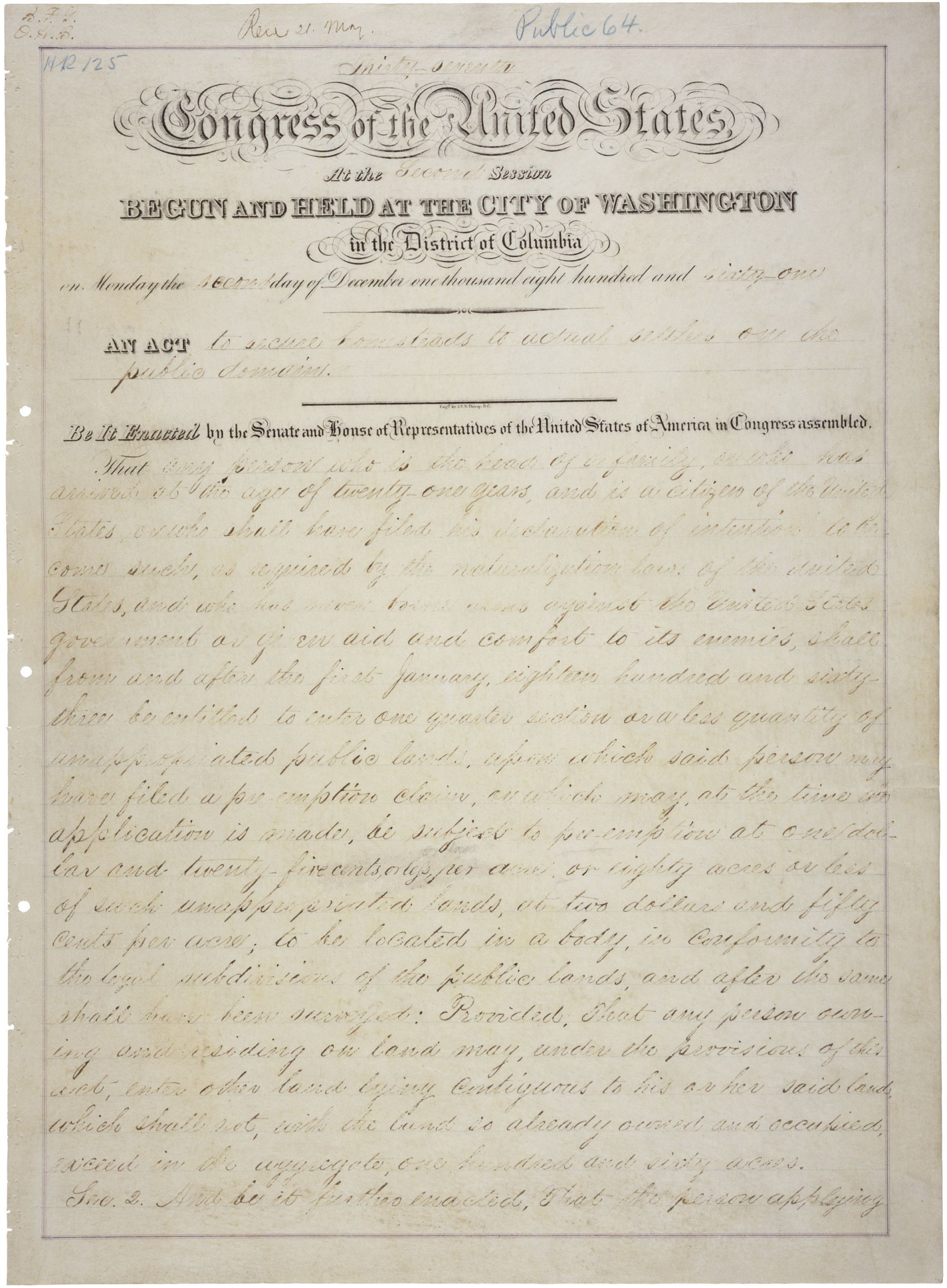
Act of May 20, 1862 (Homestead Act), Public Law 37-64 (12 STAT 392)
Page 2
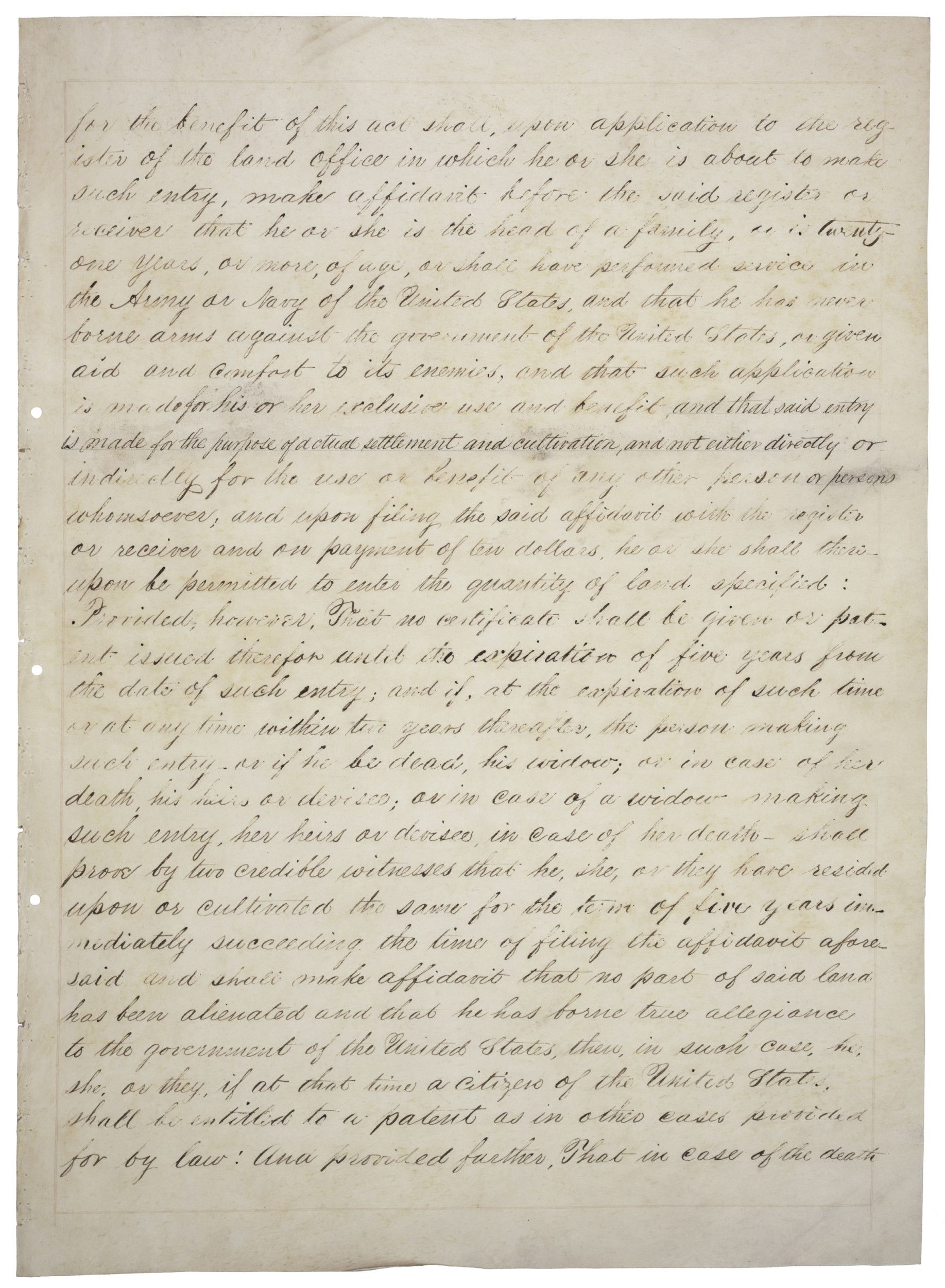
Act of May 20, 1862 (Homestead Act), Public Law 37-64 (12 STAT 392)
Page 3
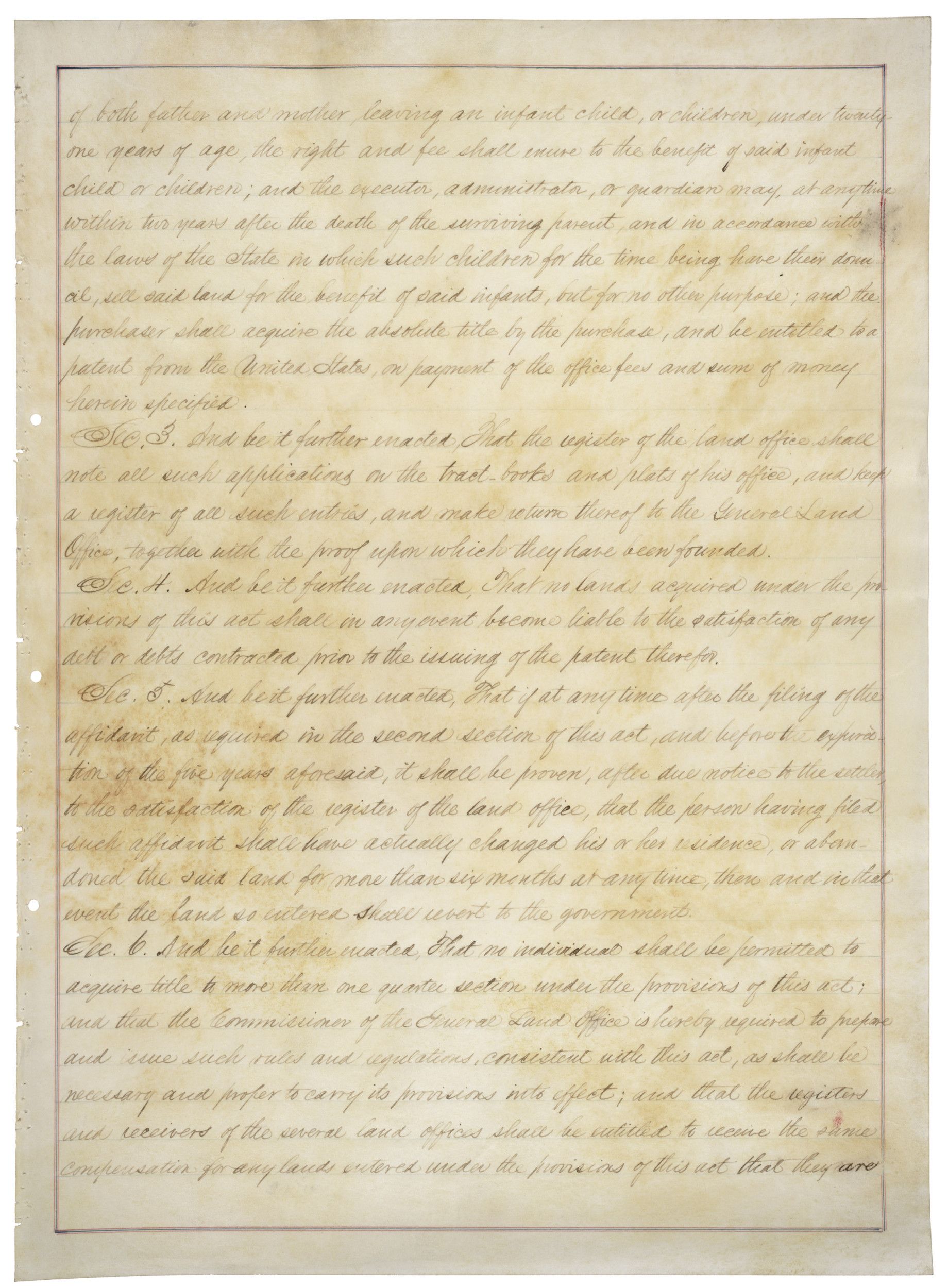
Act of May 20, 1862 (Homestead Act), Public Law 37-64 (12 STAT 392)
Page 4
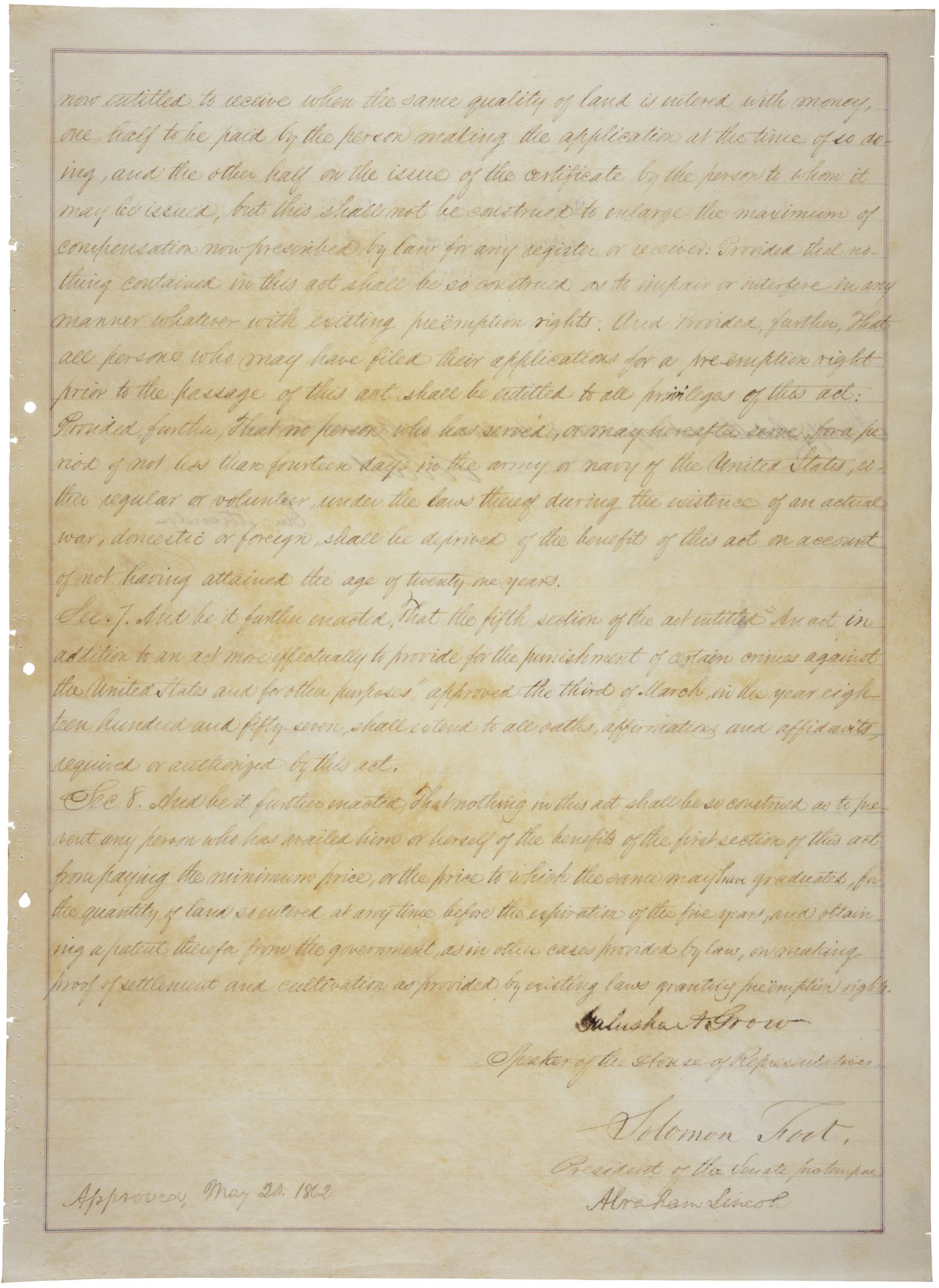
Document
Homesteading Certificate of Eligibility for Daniel Freeman
1/20/1868
Daniel Freeman was the first American to file a homestead claim for land under the Homestead Act of 1862. The act required a series of steps, such as improving a plot of land and living on it for five years, before the homesteader could gain ownership of the 160 acres he claimed. Daniel Freeman initiated his claim on January 1, 1863 and received this ownership certificate January 20, 1868.
Text adapted from “The Homestead Act of 1862” in the October 1997 National Council for the Social Studies (NCSS) publication Social Education.
Text adapted from “The Homestead Act of 1862” in the October 1997 National Council for the Social Studies (NCSS) publication Social Education.
This primary source comes from the Records of the Bureau of Land Management.
National Archives Identifier: 1656508
Full Citation: Homesteading Certificate of Eligibility for Daniel Freeman; 1/20/1868; Homestead Final Certificates, 1863 - 1887; Records of the Bureau of Land Management, ; National Archives Building, Washington, DC. [Online Version, https://docsteach.org/documents/document/homesteading-certificate-daniel-freeman, April 28, 2024]Homesteading Certificate of Eligibility for Daniel Freeman
Page 1
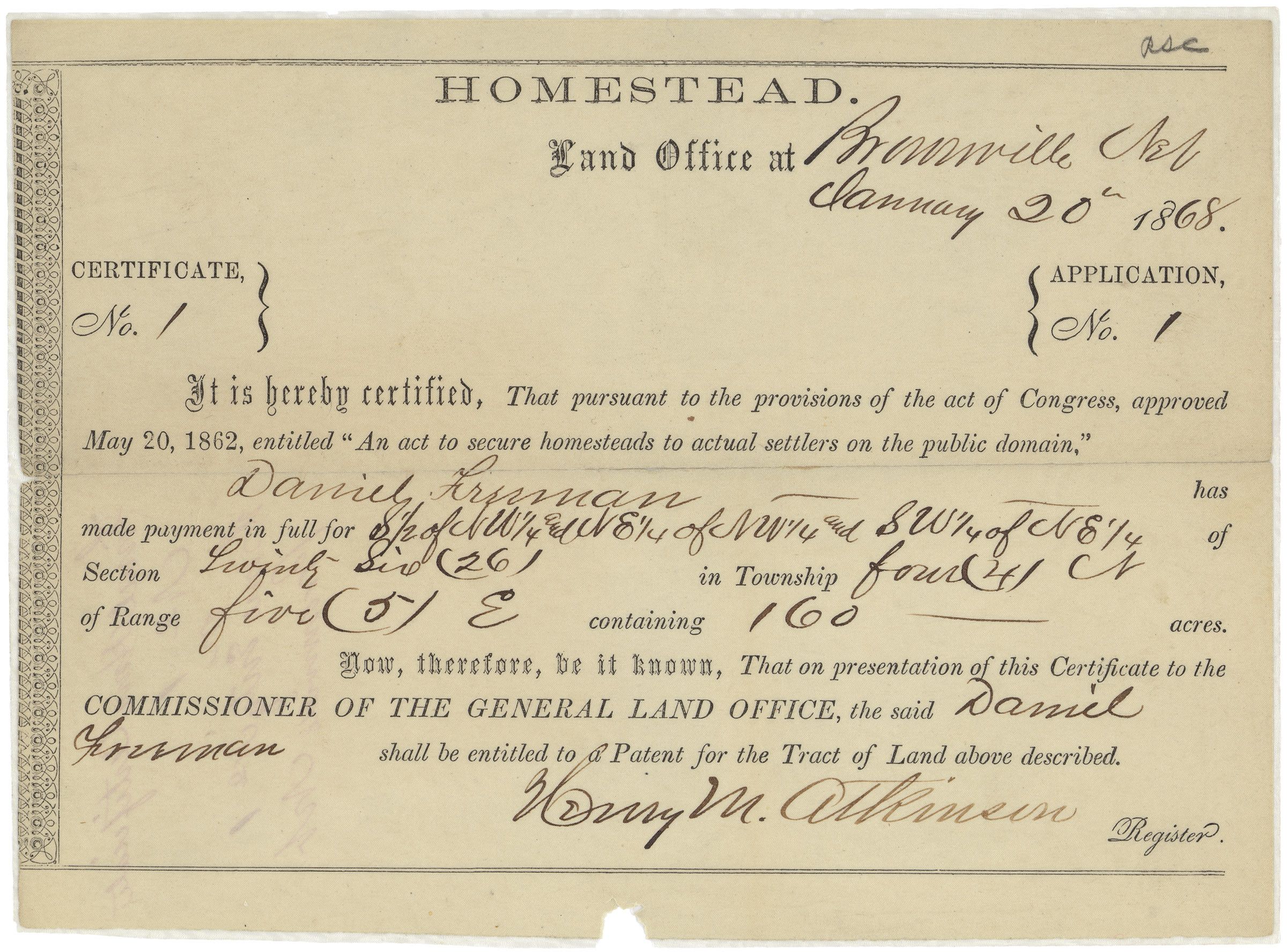
Homesteading Certificate of Eligibility for Daniel Freeman
Page 2
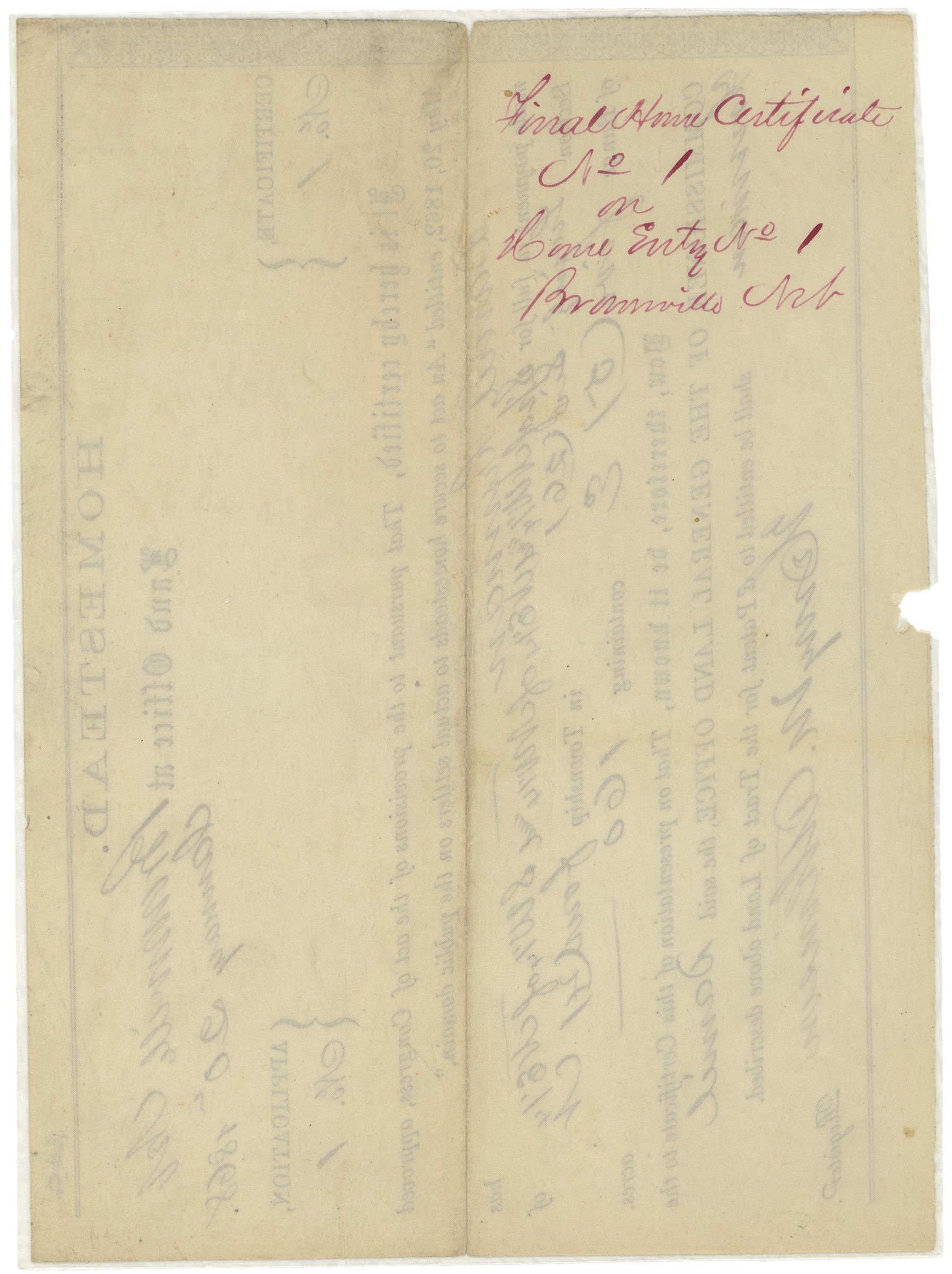
Document
Homestead Proof Testimony of Almanzo Wilder
1884
This 1884 document records the sworn statements of Almanzo Wilder that he had built a “12 ft. square frame” house in the Dakota Territory and was cultivating the land. Wilder had established the 160-acre homestead five years earlier, through the Homestead Act. It was his first home with his wife, Laura Ingalls Wilder—author of Little House on the Prairie.
Text adapted from “Evaluating Perspectives on Westward Expansion: Weighing the Evidence” in the special "Teaching Difficult Topics with Primary Sources" November/December 2011 issue of the National Council for the Social Studies (NCSS) publication Social Education.
Text adapted from “Evaluating Perspectives on Westward Expansion: Weighing the Evidence” in the special "Teaching Difficult Topics with Primary Sources" November/December 2011 issue of the National Council for the Social Studies (NCSS) publication Social Education.
This primary source comes from the Records of the Bureau of Land Management.
National Archives Identifier: 595419
Full Citation: Homestead Proof Testimony of Almanzo Wilder; 1884; 1490; Homestead Final Certificates, 1870 - 1907; Records of the Bureau of Land Management, ; National Archives Building, Washington, DC. [Online Version, https://docsteach.org/documents/document/homestead-proof-testimony-of-almanzo-wilder, April 28, 2024]Homestead Proof Testimony of Almanzo Wilder
Page 1
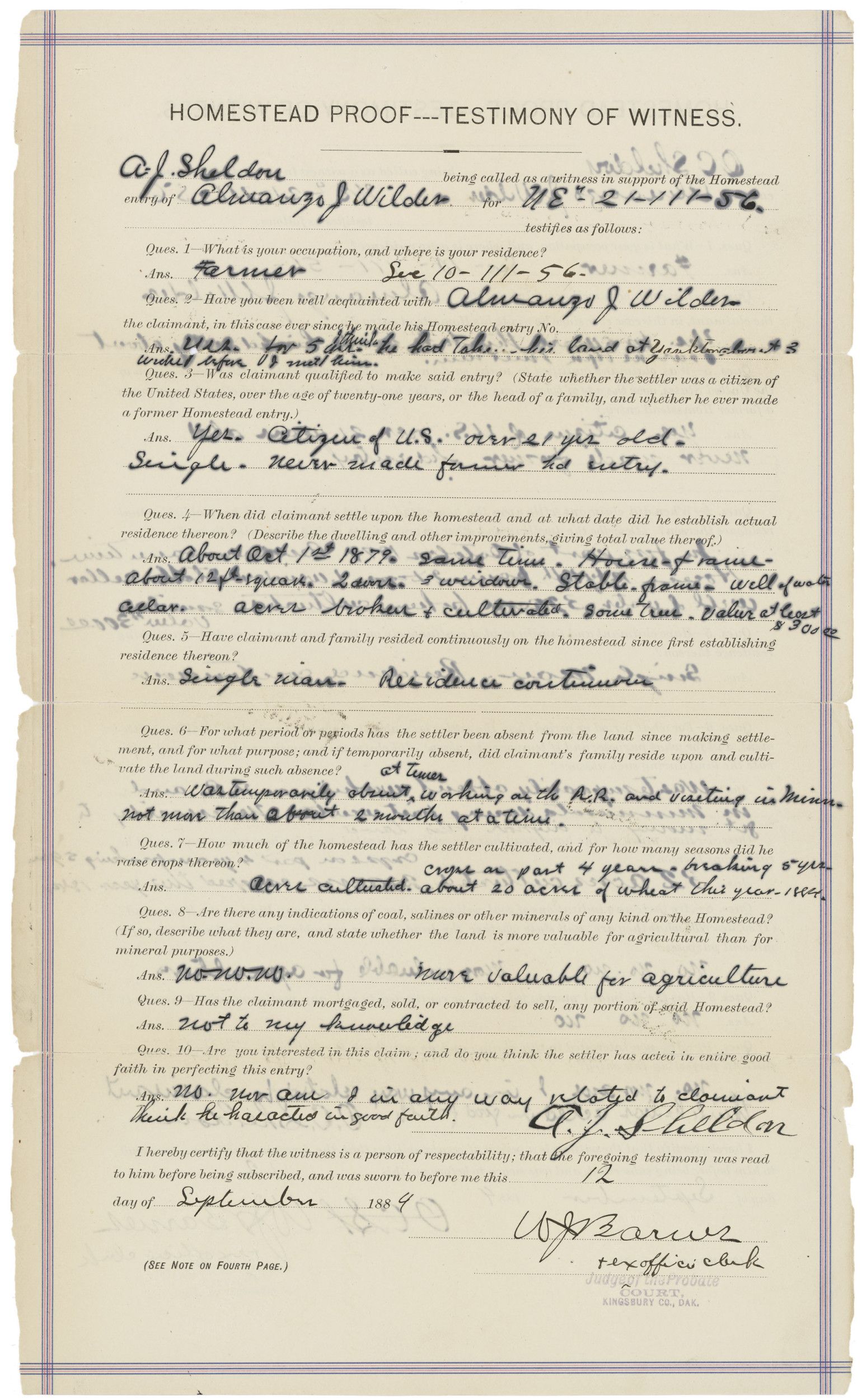
Homestead Proof Testimony of Almanzo Wilder
Page 2
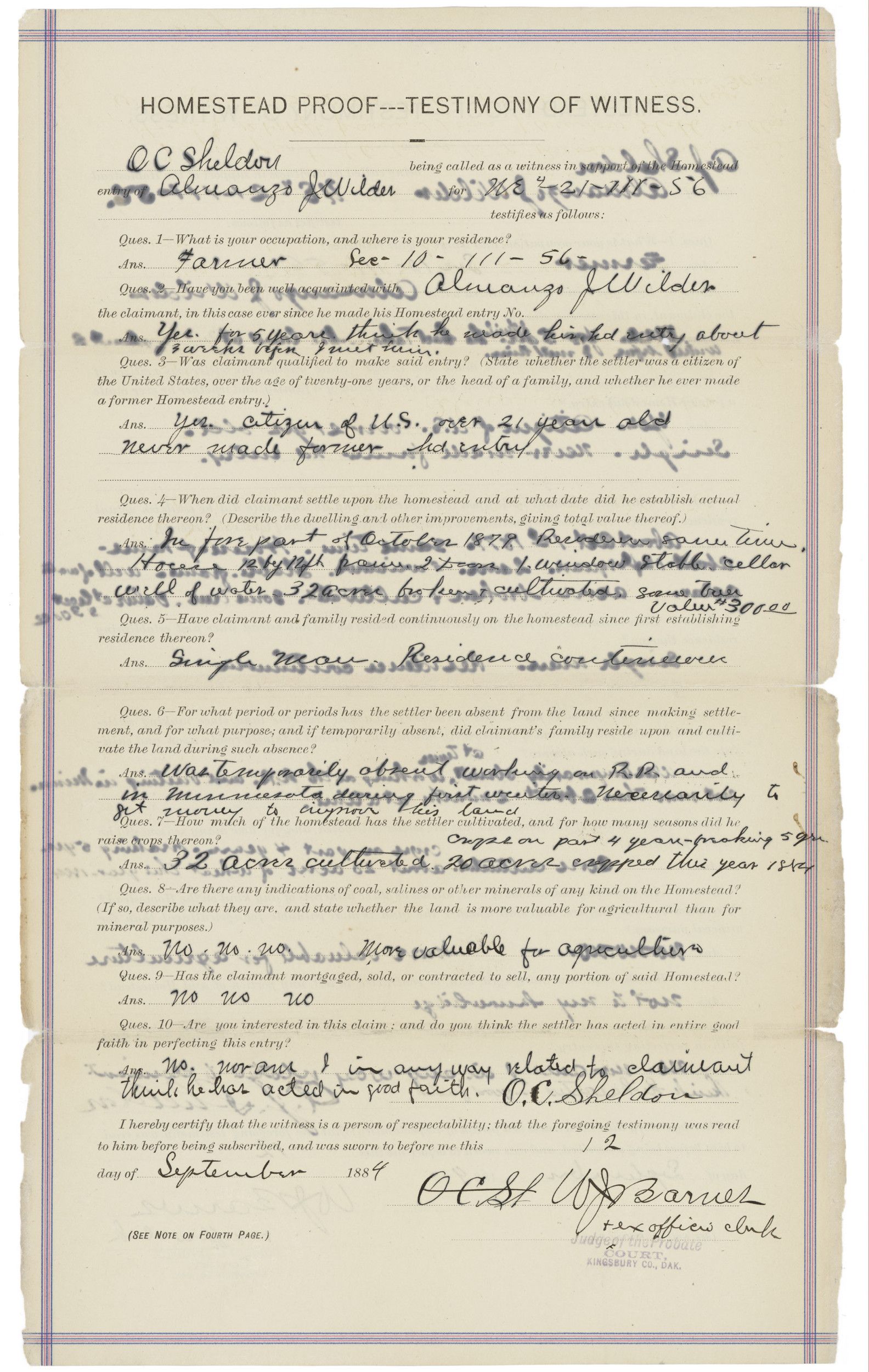
Document
Land Ordinance of 1785
5/20/1785
Early methods for allocating unsettled land outside the original 13 colonies were arbitrary and chaotic. Boundaries were established by stepping off plots from geographical landmarks. As a result, overlapping claims and border disputes were common.
The Land Ordinance of 1785 finally implemented a standardized system of Federal land surveys that eased boundary conflicts. The official Government description of land was by range, township, and section. Using astronomical starting points, territory was divided into a 6-mile square called a township prior to settlement. The township was divided into 36 sections, each measuring 1 square mile or 640 acres each.
The Government instituted direct sales to purchasers by the Government. Sale of public land was a means to generate revenue for the Government; but it also encouraged settlement and helped to propel the nation westward.
The Government instituted direct sales to purchasers by the Government. Sale of public land was a means to generate revenue for the Government; but it also encouraged settlement and helped to propel the nation westward.
This primary source comes from the Records of the U.S. House of Representatives.
National Archives Identifier: 1943531
Full Citation: Land Ordinance of 1785; 5/20/1785; (HR 9A-C3.1); Committee Papers, 1805 - 1948; Records of the U.S. House of Representatives, ; National Archives Building, Washington, DC. [Online Version, https://docsteach.org/documents/document/land-ordinance-of-1785, April 28, 2024]Land Ordinance of 1785
Page 1
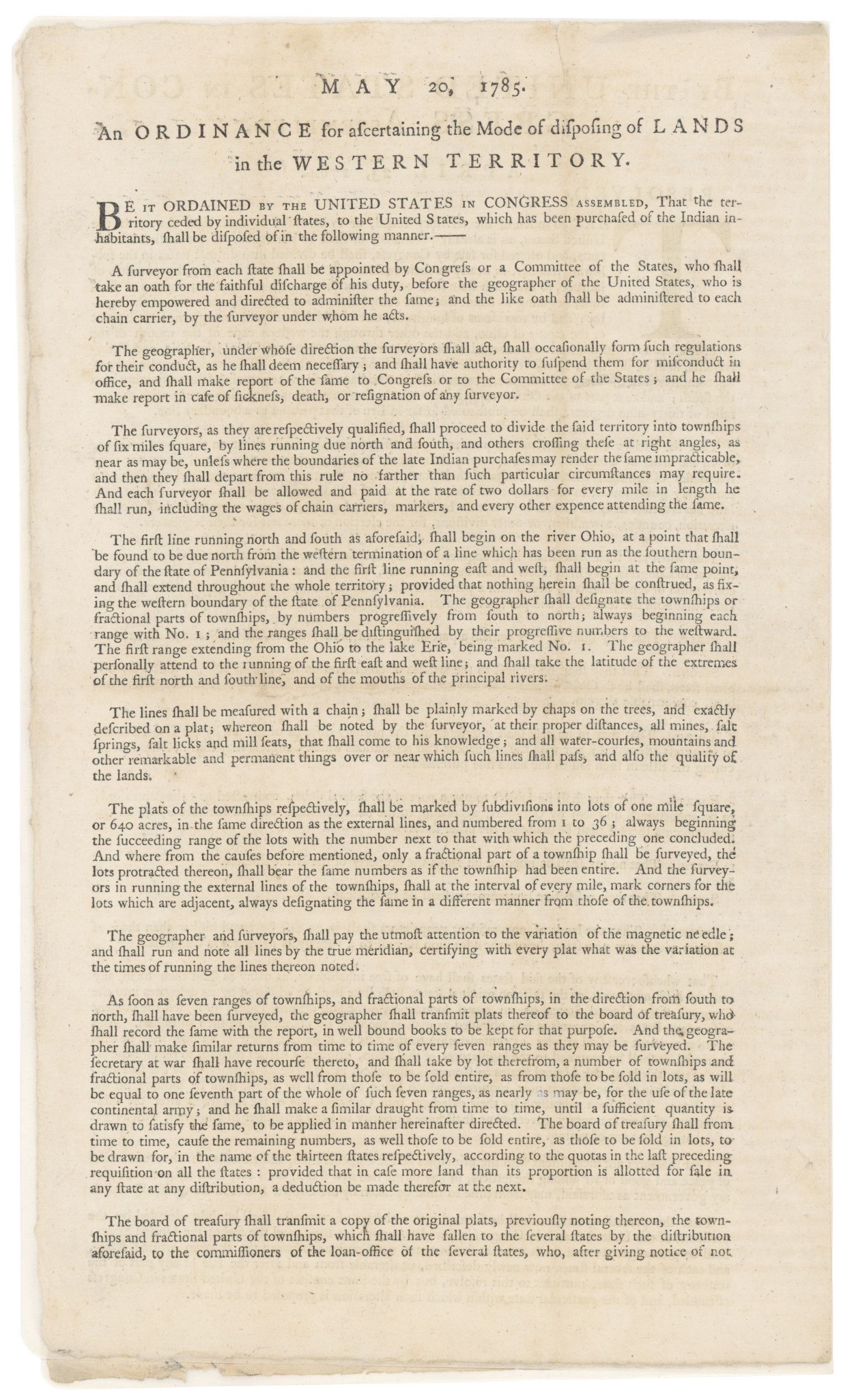
Land Ordinance of 1785
Page 2
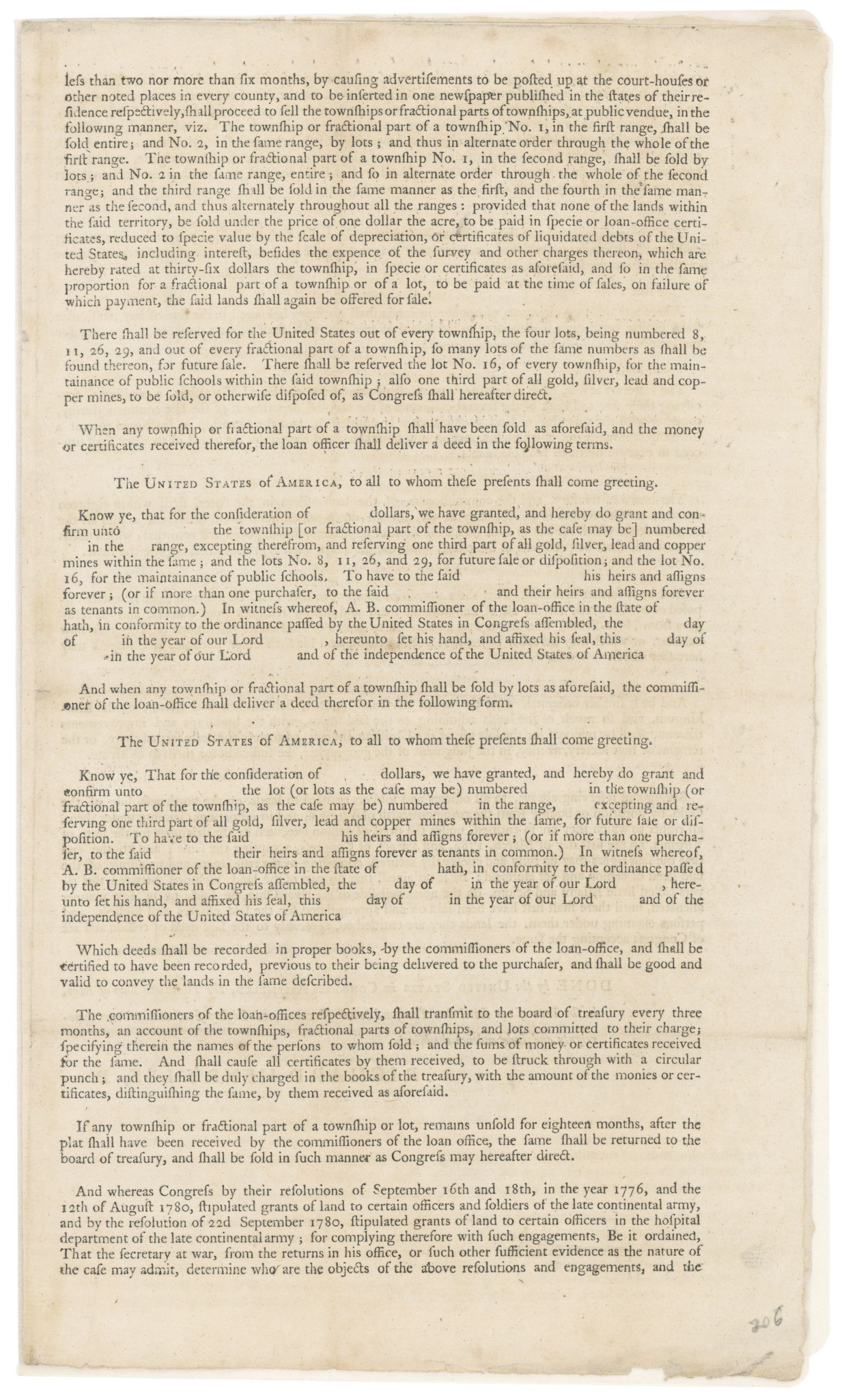
Land Ordinance of 1785
Page 3
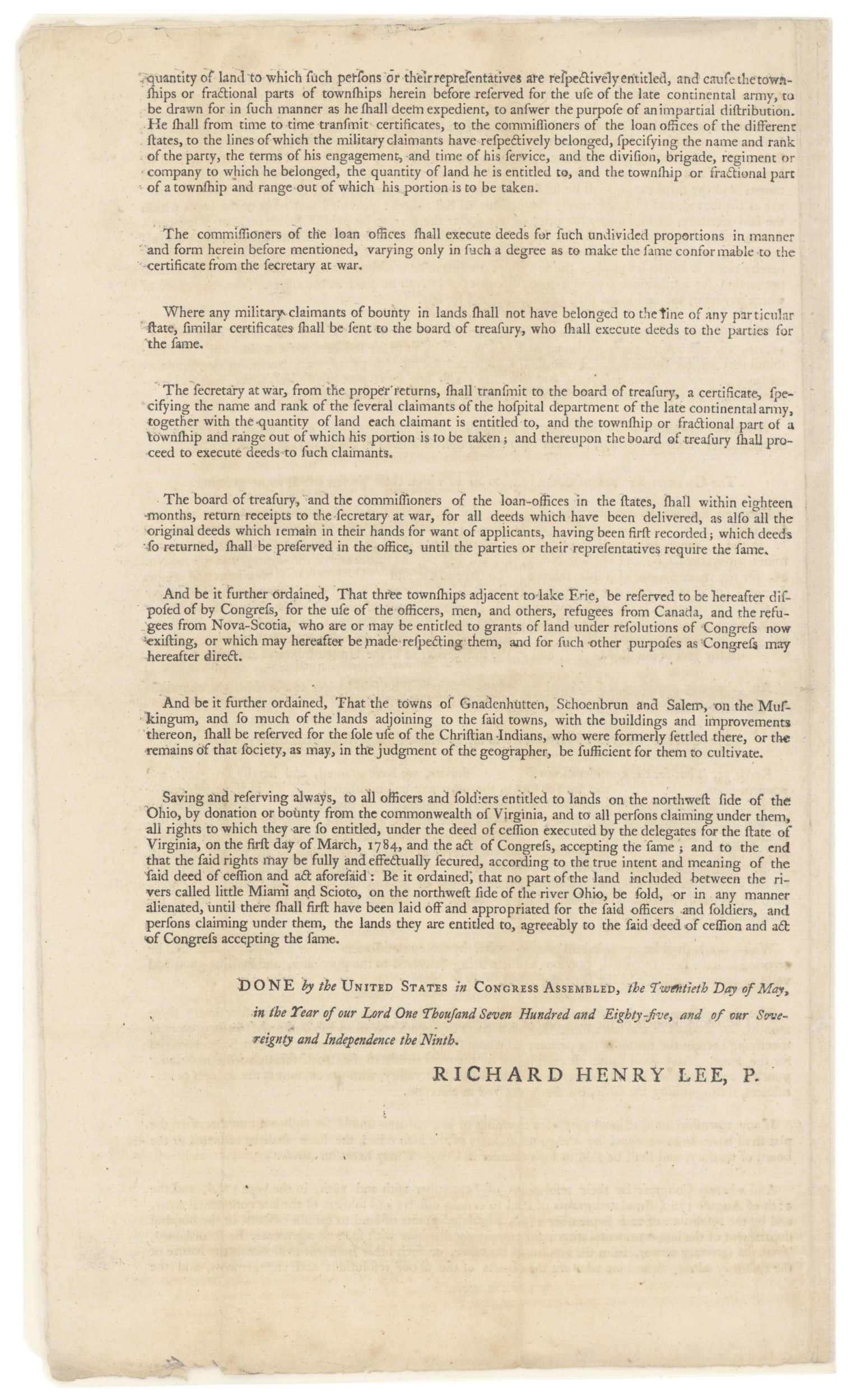
Document
Homestead Application for Virgil W. Earp
4/1/1900
Virgil Earp, the brother of famous lawman Wyatt Earp, followed his family West in the 1860s after his service with the Union Army during the Civil War. He participated in the Gunfight at the OK Corral in Arizona Territory in 1877 and filed this homestead proof at the Prescott, Arizona, Land Office on April 1, 1900.
This primary source comes from the Records of the Bureau of Land Management.
National Archives Identifier: 595307
Full Citation: Homestead Application for Virgil W. Earp; 4/1/1900; Homestead Final Certificates, 1871 - 1905; Records of the Bureau of Land Management, ; National Archives Building, Washington, DC. [Online Version, https://docsteach.org/documents/document/homestead-application-for-virgil-w-earp, April 28, 2024]Homestead Application for Virgil W. Earp
Page 1
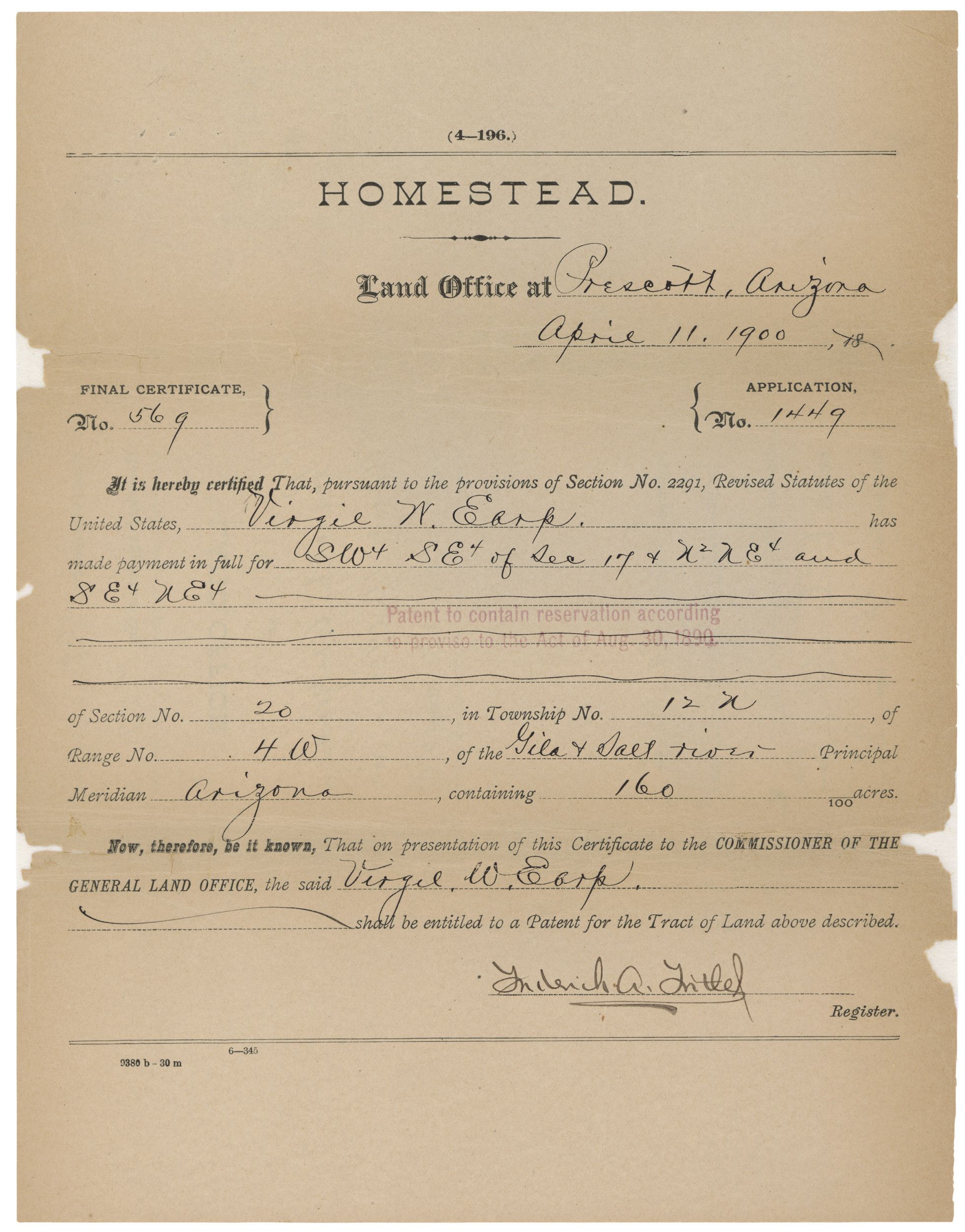
Homestead Application for Virgil W. Earp
Page 2
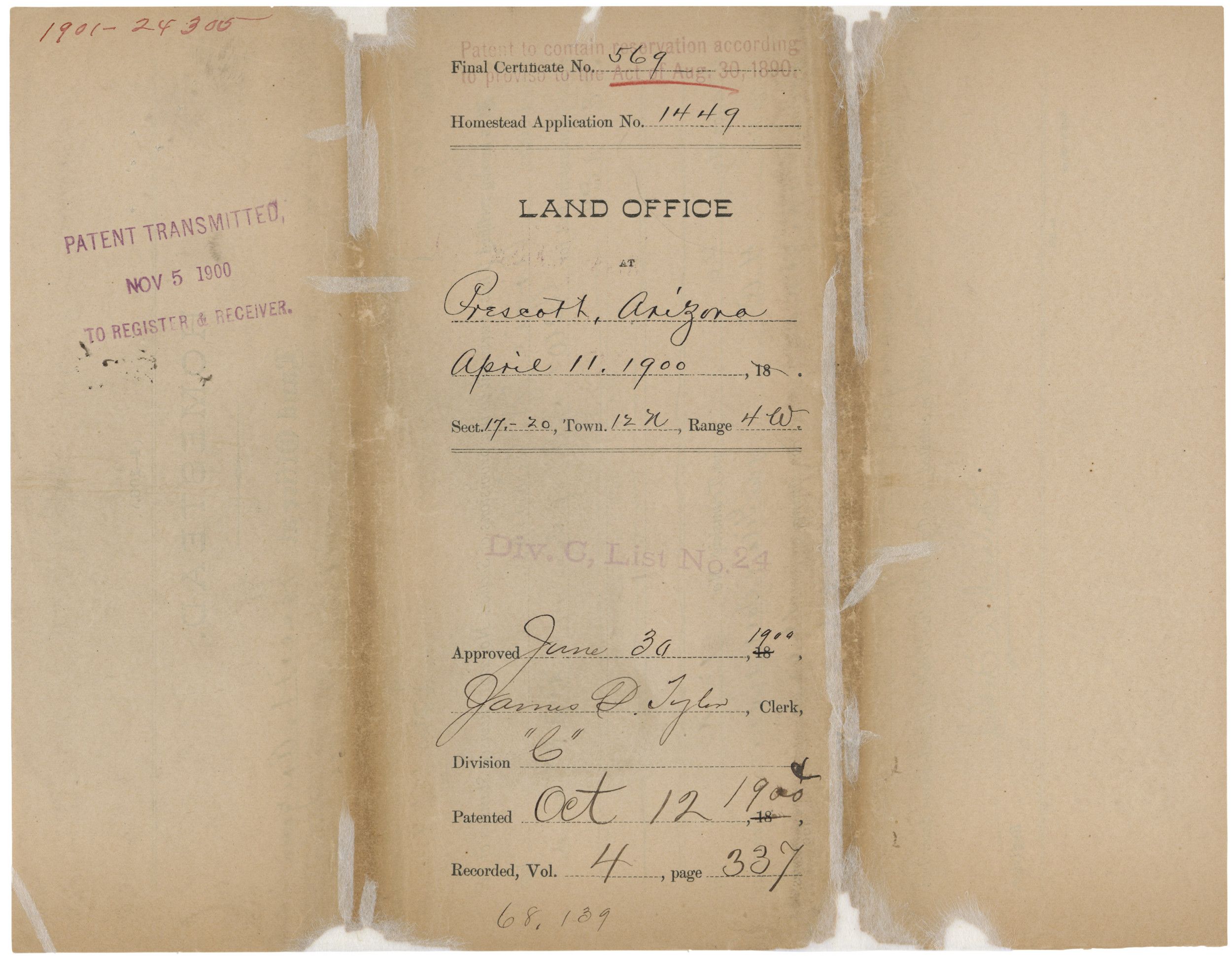
Homestead Application for Virgil W. Earp
Page 3

Homestead Application for Virgil W. Earp
Page 4

Document
Final Homestead Certificate for Almanzo Wilder
9/16/1884
Effective June 17, 1887, Almanzo Wilder received a patent granting him title to 160 acres. This certificate demonstrates that Wilder and his wife Laura Ingalls, author of Little House on the Prairie, had "proved up" or built a house, improved the land, and lived on the land for five years. Homesteaders would often displayed the patent in their home to honor their hard work.
This primary source comes from the Records of the Bureau of Land Management.
National Archives Identifier: 1656514
Full Citation: Final Homestead Certificate for Almanzo Wilder; 9/16/1884; Homestead Final Certificates, 1870–1907; Records of the Bureau of Land Management, ; National Archives Building, Washington, DC. [Online Version, https://docsteach.org/documents/document/final-homestead-certificate-for-almanzo-wilder, April 28, 2024]Final Homestead Certificate for Almanzo Wilder
Page 1
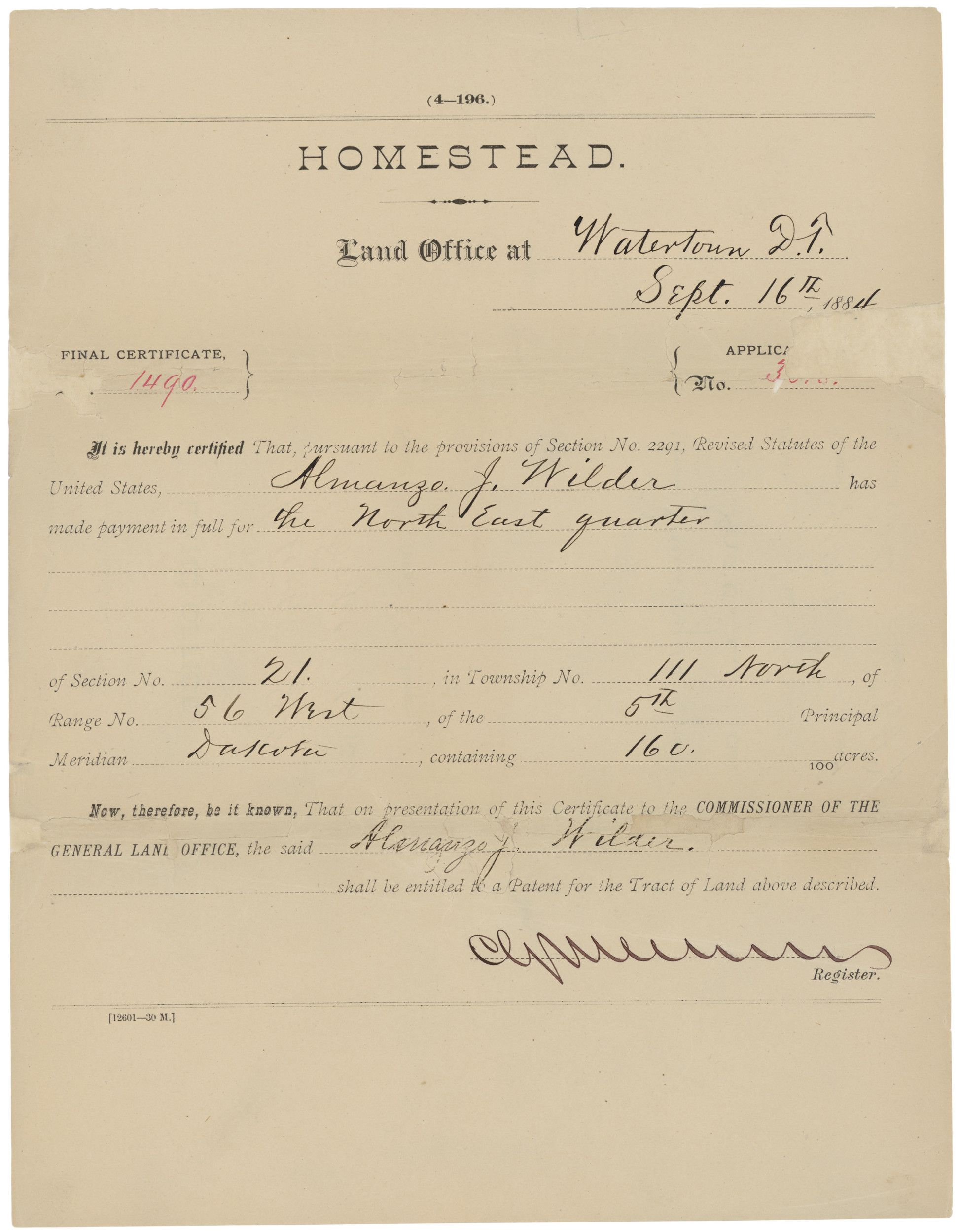
Final Homestead Certificate for Almanzo Wilder
Page 2
